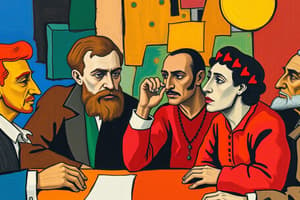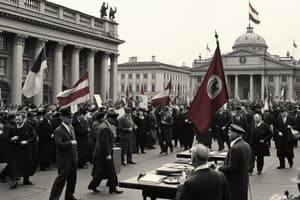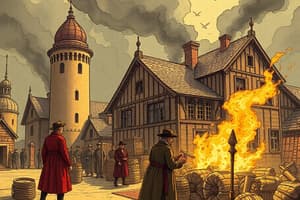Podcast
Questions and Answers
What was a key demand of liberals regarding religion in European states?
What was a key demand of liberals regarding religion in European states?
Liberals demanded a nation that tolerated all religions instead of favoring one specific religion.
How did liberals view the power of dynastic rulers?
How did liberals view the power of dynastic rulers?
Liberals opposed the uncontrolled power of dynastic rulers and sought to safeguard individual rights against government overreach.
What form of government did liberals advocate for in their political ideology?
What form of government did liberals advocate for in their political ideology?
Liberals advocated for a representative, elected parliamentary government.
In what way did radicals differ from liberals regarding voting rights?
In what way did radicals differ from liberals regarding voting rights?
What significant social movement did many radicals support?
What significant social movement did many radicals support?
What was a core belief of the socialist ideology that emerged in the twentieth century?
What was a core belief of the socialist ideology that emerged in the twentieth century?
How did socialists view the class system in society?
How did socialists view the class system in society?
What was a common element in both radical and socialist ideologies?
What was a common element in both radical and socialist ideologies?
How did Marxist theory contribute to the development of socialist thought?
How did Marxist theory contribute to the development of socialist thought?
What was the main reason liberals were not considered democrats?
What was the main reason liberals were not considered democrats?
Flashcards are hidden until you start studying
Study Notes
Cooperatives and Socialist Thought
- Socialists argued that cooperatives required government support for widespread establishment, not just individual initiative.
- Louis Blanc advocated for government encouragement of cooperatives to replace capitalist firms, aiming for collective production and profit sharing among workers.
Marxist Theory
- Karl Marx viewed modern industrial society as fundamentally capitalist, wherein capitalists owned production means and profited from workers' labor.
- He posited that workers' conditions would not improve while profits remained with private capitalists.
- Marx urged workers to overthrow capitalism and private property, aspiring to create a socialist society with collective ownership.
- He believed in the eventual triumph of the proletariat, leading to a communist society as the outcome of this struggle.
Historical Context of Social Change
- The French Revolution inspired new ideas regarding freedom and equality, challenging the existing societal structure dominated by the aristocracy and church.
- Post-revolution discussions of rights and social power emerged in various regions, including India with figures like Raja Rammohan Roy, reflecting global engagement with revolutionary ideas.
Variations in Political Ideology
- Political responses to societal change ranged from conservatives accepting gradual transformation to radicals advocating for radical restructuring.
- Understanding the labels 'liberals,' 'radicals,' and 'conservatives' is crucial as their meanings can differ across contexts and time periods.
Liberals, Radicals, and Conservatives
- Liberals sought a secular state that tolerated all religions, opposed the unchecked authority of dynastic rulers, and advocated for a representative parliamentary government.
- They emphasized individual rights and the importance of an independent judiciary but were not proponents of universal suffrage, favoring voting rights primarily for propertied men.
- Radicals, in contrast, aimed for a government reflective of the majority population and actively supported women's suffrage movements, seeking broader inclusivity in governance.
Studying That Suits You
Use AI to generate personalized quizzes and flashcards to suit your learning preferences.




